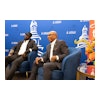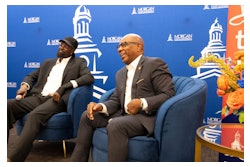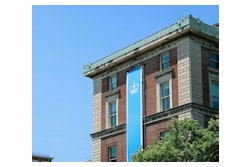WASHINGTON, D.C.
In an effort to impart American college students with a better outlook on world events, two U.S. Senators are proposing a partnership with higher education that would dramatically expand the study abroad program.
An estimated 1 million U.S. college students would study abroad every year over the next decade if the Abraham Lincoln Study Abroad Act, introduced by Sens. Dick Durbin, D-Ill., and Norm Coleman, R-Minn., is approved by the full Congress. Under the bill, study abroad opportunities would also become more diverse in terms of participants, fields of study and destinations, with more students studying in developing countries.
Slightly more than 191,000 U.S. students participated in study abroad programs during the 2003-2004 academic year, according to the Institute of International Education’s “2005 Open Doors Report” on educational exchange.
Coleman says the opportunity for U.S. undergraduates to study abroad should be the norm rather than the exception. “The benefits achieved from incorporating study abroad opportunities into the college experience are immeasurable. By interacting with citizens of other countries, U.S. students gain a better understanding of our global community and are able to apply that knowledge here at home,” he said in a statement.
“These types of opportunities should be available to all students regardless of their financial situation, college major or required coursework, and should be expanded to additional countries around the world,” he said.
The legislation proposes federal scholarships for overseas studies and encourages colleges to address on-campus barriers to study abroad, such as those related to curriculum, faculty involvement, institutional leadership and programming.
The 9.6 percent increase in study abroad participation in 2003-2004 demonstrates the importance of a study abroad experience in the post-9/11 world, advocates say.
Just one percent of U.S. college undergraduates study abroad, despite opinion polls indicating that more than three-quarters of Americans believe it is important to do so.
“Strong study abroad programs are important to our economic competitiveness, our future diplomacy and security and clearly the education of our students,” says Peter McPherson, chair of the Abraham Lincoln Commission on Study Abroad and president of the National Association of State Universities and Land-Grant Colleges, an association of public universities.
“For the American work force to be competitive in the global marketplace, our students need experience in and knowledge about the world outside the U.S.,” McPherson says.
The Abraham Lincoln Study Abroad Act was inspired by the work of U.S. Sen. Paul Simon, the late Democratic senator from Illinois. He had laid out his vision in a national commission report, where he said “that with many more U.S. college students studying abroad, the United States would be “more understanding of the world … creating a base of public opinion that would encourage responsible action.”
“The international study abroad program we are introducing is based on his [Sen. Simon’s] vision and advances his work,” says Durbin. “This program will instill in the next generation of Americans a deeper understanding of the cultures and histories of other nations. This, in turn, will enhance the United States’ capacity to lead in the 21st century.”
NAFSA: Association of International Educators supports the proposal and is urging Congress to pass and fully fund the Abraham Lincoln Study Abroad Act. The bill has not been introduced in the House of Representatives.
“This program over the next generation can change America,” McPherson says.
— Diverse staff reports
|
Reader comments on this story: |
|
There are currently no reader comments on this story. |
© Copyright 2005 by DiverseEducation.com


















